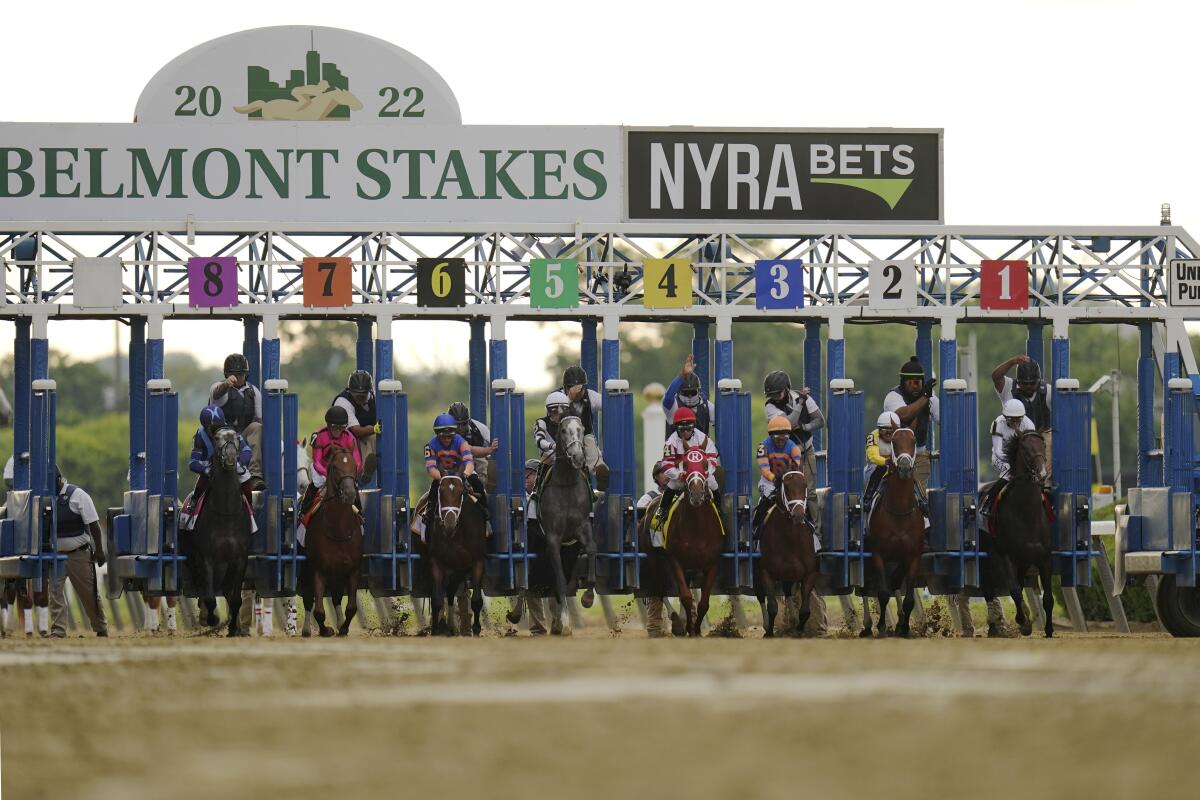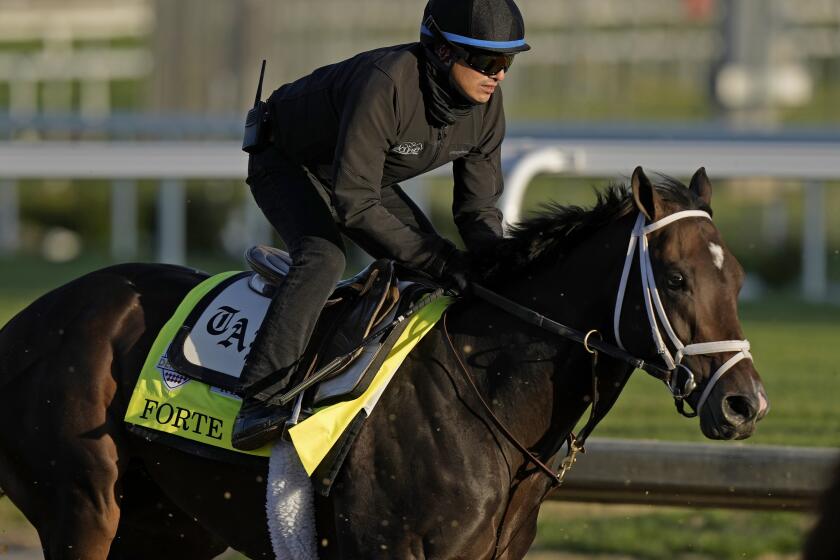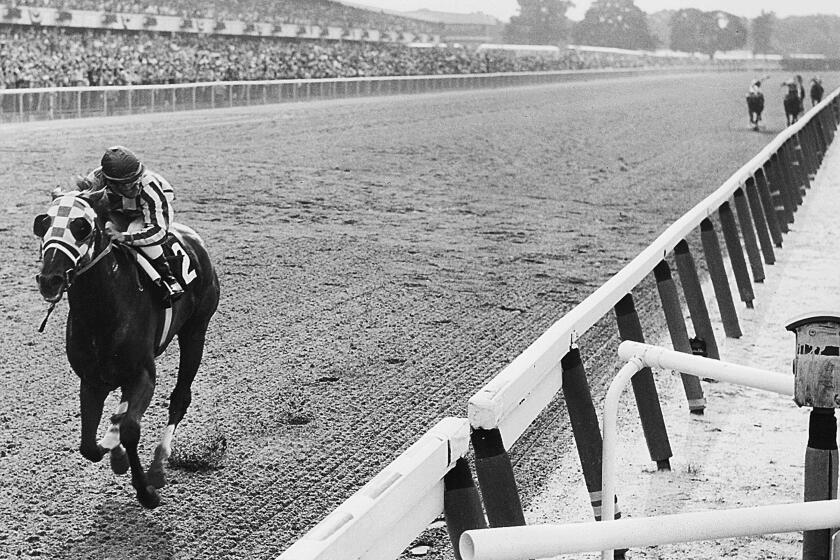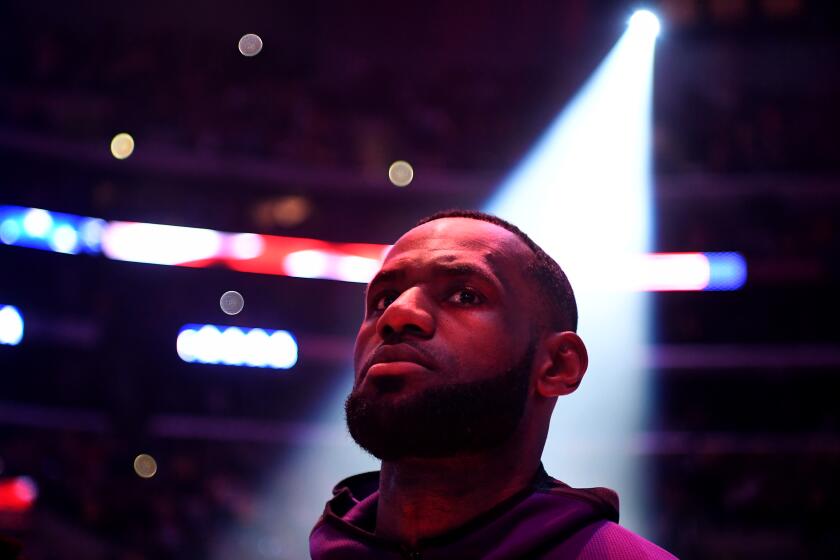Have three races in five weeks for horse racing’s Triple Crown made it obsolete?

- Share via
It’s a discussion that happens every year. Horses spend five months preparing for the Kentucky Derby, running three prep races, or maybe just two. Then when it’s Triple Crown showtime, they are asked to run three races in five weeks.
Most say, no. This year, not one horse will run in all three races. The last horse to run all the legs was War of Will in 2019.
Ideas have been floated to run the Kentucky Derby in May, the Preakness Stakes in June and the Belmont Stakes in July, or some other formula that allows more time between races. Many of those in the racing industry, when faced with the idea of change, would just as soon wrap their arms around Tevye in his horse-drawn wagon and belt out a rousing version of “Tradition.”
Yet faced with a year like this, when the Kentucky Derby that came up two horses short of a full field and the best one on the sideline, a Preakness Stakes that could generously be called mediocre, and Saturday’s nine-horse Belmont Stakes considered the best field of them all, it’s legitimate to ask if the current Triple Crown format is obsolete.
“I don’t think it’s ever good to stick your head in the sand and say never,” said Kate Tweedy, who as the daughter of Secretariat owner Penny Chenery Tweedy, is Triple Crown royalty. “It’s important for the sport to improve itself. I’m in favor of changes that moves us in that direction.
“Horses are much more lightly raced. They used to be much tougher, heavily raced. Horses can’t stand that grueling of a test [of three races in five weeks]. I’m in favor of moving them further down the calendar.”
Todd Pletcher-trained Forte is 5-2 favorite for Belmont Stakes after scratching from Kentucky Derby. Tapit Trice and Angel of Empire also given low odds.
Tweedy does have one caveat.
“You would have to put a full stop at the end of all the previous records and start a new set of records,” Tweedy said. “I don’t like to mess with history, but you have to change with the times.”
This year is the 50th anniversary of Secretariat winning the Triple Crown, all with record times that remain in place.
The race with the most to gain is the Preakness Stakes, which comes two weeks after the Kentucky Derby. Most horses, after a rough trip in the Derby, prefer to wait the five weeks and come back in the Belmont Stakes.
This year the television contract is not exclusively held by NBC, with the Belmont moving to FOX. That lessens the power one network has over the scheduling. Could the Preakness unilaterally move the race back one more week?
“I guess we could,” said Aiden Butler, chief executive of 1st/Racing, which runs the Preakness. “We could say, don’t worry about [the Belmont]. But we have a really good relationship with both Churchill and NYRA [New York Racing Assn.]. It hasn’t always been the case.
“The Triple Crown Inc. is a thing we own between the three of us. So, you would want to be thoughtful and mindful. Sometimes it’s a little unfair on NYRA because it’s not that crazy an event unless there is a Triple Crown in play. It means most of the time they have to carry the burden of that third leg. But when they get the possibility of a Triple Crown winner it boosts the whole ecosystem of the Triple Crown.”
Is The Stronach Group, of which 1st/Racing is a part, in favor of change?
“Our company is straight down the middle,” Butler said. “A lot of them want to do it, a lot of them don’t.”
Even after 50 years, Secretariat is the standard against which all horses are measured. His Kentucky Derby, Preakness and Belmont records still stand.
Though trainers hold enormous sway in when and where a horse runs, it’s ultimately the owner’s decision. And again, it’s the “T” word that comes up.
“It’s a sport built on tradition,” said Gary Fenton, managing partner at Little Red Feather Racing. “I would keep it. You aim for the Derby and if you don’t get into the field, you have another big race right behind it. If I were a race track, I could see where they might want to change it. But as an owner, keep it the same.”
Hall of Fame trainer Bob Baffert has won two Triple Crowns and 17 Triple Crown races, so it’s no surprise he likes things the way they are.
“We’ve thought about that but it’s very important [to make it difficult] because that’s what makes the Triple Crown,” Baffert said in Baltimore the day before winning the Preakness with National Treasure. “A lot of people don’t run their horses back [in the Preakness]. You have to remember, we run them a lot just to get them into the Derby. I think [trainers] would run them back if they felt their horses came out of it well. The Derby can be 20 horses, so if you get a rough trip, they need that extra time to come back.”
Another Hall of Fame trainer, Shug McGaughey, a self-proclaimed “traditionalist” while saying he would be open to new ideas, falls back on what’s worked so well all these years.
‘”No matter who you are, you’ve got to open your eyes a little bit to what’s going to be best for racing and best for the horse,” McGaughey said. “I mean, I think it is exciting and throws a little intrigue into it, with these horses having to run back in two weeks. And usually with that, we get some decent horses that haven’t run in the Kentucky Derby.”
The only remaining connection to the race is the jockey, and the answer is similar to the trainers.
“I like everything,” said Victor Espinoza, who won the Triple Crown aboard American Pharoah in 2015. “I don’t think it should be changed at all. It’s been done for many, many years and it’s why not many horses have won a Triple Crown. It requires an incredible and amazing horse to win it and it should stay that way.”
For now, it seems as if racing would be happy just to have a few horses run all three races.
More to Read
Go beyond the scoreboard
Get the latest on L.A.'s teams in the daily Sports Report newsletter.
You may occasionally receive promotional content from the Los Angeles Times.













